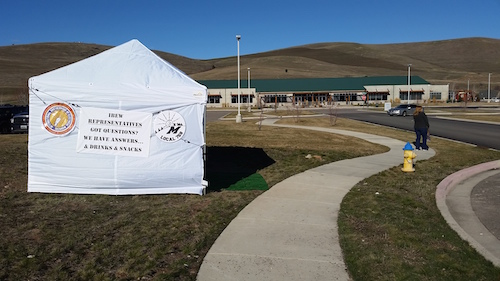When AT&T closed a deal to buy DirecTV last July, employees of the satellite provider sat up and took notice
While the satellite industry has long been resistant to union organizing, AT&T’s relationship with the IBEW dates back more than 120 years to the birth of the union and to the advent of the telecommunications industry itself.
For the last 20 years, the two have mutually benefited from labor-friendly neutrality and card-check agreements that make it easier to form a union, an arrangement that was recently extended to cover DirecTV.

|
| Organizers used this tent outside DirecTV’s Missoula, Mont., call center to educate employees in the campaign’s early stages.
|
Now, the satellite giant’s employees, who became eligible to start signing cards on March 1, are joining on with the IBEW all over the United States. In the first month, more than 2,100 people in 11 DirecTV units achieved majority support to join the IBEW in Arizona, Colorado, Hawaii, Idaho, Iowa, Montana, Minnesota, Pennsylvania, South Dakota, Utah and Washington.
Organizers hope they’re just the start. Another dozen campaigns are well underway, supported by International and local organizers, with the potential for another 3,500 DirecTV employees who could soon enjoy the benefits of IBEW representation.
“We’re so happy to welcome these 2,100 future members from DirecTV,” said IBEW International President Lonnie R. Stephenson. “Not only will they be some of the newest members of our great union, but they’re leaders of a movement that we hope will bring thousands more of their colleagues from across the country along with them in the next few months.”
The largest collection of organized working men and women so far—more than 650—are employed at DirecTV’s massive call center in Missoula, Montana. Employee organizers began the process of educating their co-workers about the union last December, but the effort really escalated in January.
“This group of leaders really stepped up and took ownership of the future of their workplace,” said Bob Brock, the IBEW’s regional organizing coordinator for the Western U.S. “From day one, they understood what IBEW Brotherhood could do for them, and they went after it with everything they had.”
Ben Dawson, one of the Missoula employees who originally reached out to IBEW organizers, credited the dozens of his colleagues who took on leadership roles, educated their co-workers and collected union cards.
From the first signed card on March 16, it took just six days to collect the 326 more required to certify the unit. “This was really a ground-up, grassroots education campaign,” Dawson said. In February, the company announced major changes to shift-scheduling, including plans to eliminate part-time work and school scheduling, an important issue in the university town.
“I think people were worried about their jobs, about their ability to schedule child-care or doctor’s appointments,” Dawson said. “This became a movement about ordinary working people deserving stability and a voice in their workplace. People deserve to be able to see their families at night.”
For installation technicians in Idaho, the issues were different, but the result was the same. DirecTV installers there chose to join the IBEW to gain consistency in decision-making, fair compensation and to have their opinions heard by management.
Earlier this year, DirecTV announced a plan to move the install techs from a piece-rate pay scale to an hourly one, which would effectively cut their annual pay in half in many cases. “Before, a manager could basically decide how much you were going to be able to make in any given month,” said Jason Taylor, one of the Idaho technicians who led the unionization effort. “There was no real consistency in the leadership, and that’s what really helped us convince our co-workers that we needed a union.”
With their 120-member unit now recognized, Taylor is eager to join Boise, Idaho, Local 291 and to get started negotiating a first contract. “We’re losing money every day,” he said of the new hourly rate, “so the sooner we get this settled, the better.”
Elsewhere, the IBEW is organizing DirecTV technicians and call center employees in dozens of locations across the county, and many are on the verge of achieving majority status. Members of the newly organized units are even reaching out to their colleagues in other states, providing assistance, advice and sometimes just reassurance that they’re making the right decision.
“I can’t say enough about our organizers out on the ground and the staff involved in this DirecTV campaign here in the International Office,” said Stephenson, “but the real credit in any organizing campaign goes to the working men and women who raise their voices and demand to be heard. We know what a leap of faith that is, and we’re happy these folks put their trust in the IBEW.”